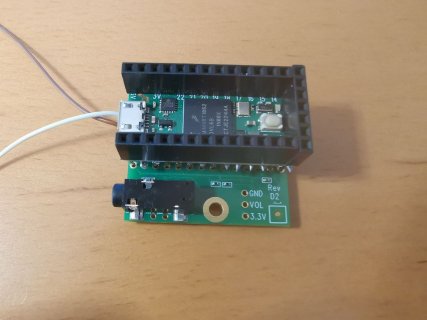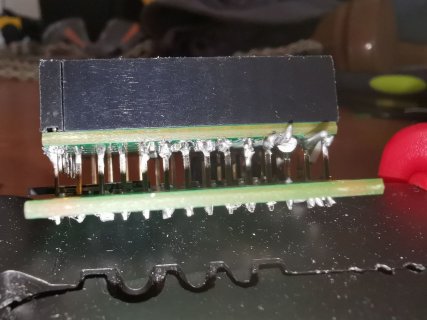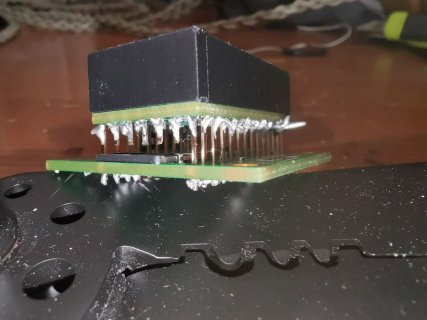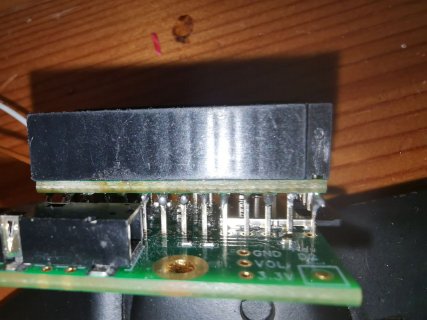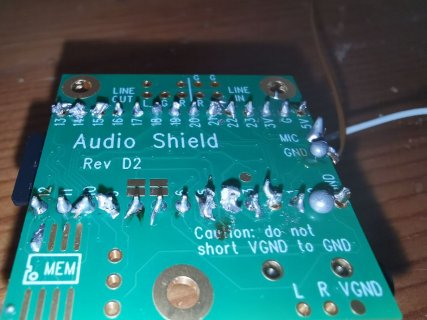I tried to get the audioguestbook code (https://github.com/playfultechnology/audio-guestbook) work, but it stops with an error called "unable to acess SD card"
i have a teensy 4.0 with a teensy audio shield revD2 for the teensy 4.x.
software arduiono 1.8.19 + TeensyDuino 1.58.
settings: i use the libary of the teensyDuino installer, the Teensy is connectet via COM 13, Serial + MTP disk
the example codes give no respons from the audioshild, no beep, no sd card reading while the teensy seems to work propertly.
the pins are connected properly, the sd card is formated in FAT32
There is absolute no response of the shield, how can i test if it is a hardware problem or a software problem.
maybe someone of you know a typicall pitfall in installing or configuration of the shield, i dont know what to do now.
here is the code:
i have a teensy 4.0 with a teensy audio shield revD2 for the teensy 4.x.
software arduiono 1.8.19 + TeensyDuino 1.58.
settings: i use the libary of the teensyDuino installer, the Teensy is connectet via COM 13, Serial + MTP disk
the example codes give no respons from the audioshild, no beep, no sd card reading while the teensy seems to work propertly.
the pins are connected properly, the sd card is formated in FAT32
There is absolute no response of the shield, how can i test if it is a hardware problem or a software problem.
maybe someone of you know a typicall pitfall in installing or configuration of the shield, i dont know what to do now.
here is the code:
Code:
#include <Bounce.h>
#include <Audio.h>
#include <Wire.h>
#include <SPI.h>
#include <SD.h>
#include <TimeLib.h>
#include <MTP_Teensy.h>
#include "play_sd_wav.h" // local copy with fixes
// DEFINES
// Define pins used by Teensy Audio Shield
#define SDCARD_CS_PIN 10
#define SDCARD_MOSI_PIN 7
#define SDCARD_SCK_PIN 14
// And those used for inputs
#define HOOK_PIN 0
#define PLAYBACK_BUTTON_PIN 1
#define noINSTRUMENT_SD_WRITE
// GLOBALS
// Audio initialisation code can be generated using the GUI interface at [url]https://www.pjrc.com/teensy/gui/[/url]
// Inputs
AudioSynthWaveform waveform1; // To create the "beep" sfx
AudioInputI2S i2s2; // I2S input from microphone on audio shield
AudioPlaySdWavX playWav1; // Play 44.1kHz 16-bit PCM greeting WAV file
AudioRecordQueue queue1; // Creating an audio buffer in memory before saving to SD
AudioMixer4 mixer; // Allows merging several inputs to same output
AudioOutputI2S i2s1; // I2S interface to Speaker/Line Out on Audio shield
AudioConnection patchCord1(waveform1, 0, mixer, 0); // wave to mixer
AudioConnection patchCord3(playWav1, 0, mixer, 1); // wav file playback mixer
AudioConnection patchCord4(mixer, 0, i2s1, 0); // mixer output to speaker (L)
AudioConnection patchCord6(mixer, 0, i2s1, 1); // mixer output to speaker (R)
AudioConnection patchCord5(i2s2, 0, queue1, 0); // mic input to queue (L)
AudioControlSGTL5000 sgtl5000_1;
// Filename to save audio recording on SD card
char filename[15];
// The file object itself
File frec;
// Use long 40ms debounce time on both switches
Bounce buttonRecord = Bounce(HOOK_PIN, 40);
Bounce buttonPlay = Bounce(PLAYBACK_BUTTON_PIN, 40);
// Keep track of current state of the device
enum Mode {Initialising, Ready, Prompting, Recording, Playing};
Mode mode = Mode::Initialising;
float beep_volume = 0.04f; // not too loud :-)
uint32_t MTPcheckInterval; // default value of device check interval [ms]
// variables for writing to WAV file
unsigned long ChunkSize = 0L;
unsigned long Subchunk1Size = 16;
unsigned int AudioFormat = 1;
unsigned int numChannels = 1;
unsigned long sampleRate = 44100;
unsigned int bitsPerSample = 16;
unsigned long byteRate = sampleRate*numChannels*(bitsPerSample/8);// samplerate x channels x (bitspersample / 8)
unsigned int blockAlign = numChannels*bitsPerSample/8;
unsigned long Subchunk2Size = 0L;
unsigned long recByteSaved = 0L;
unsigned long NumSamples = 0L;
byte byte1, byte2, byte3, byte4;
void setup() {
Serial.begin(9600);
while (!Serial && millis() < 5000) {
// wait for serial port to connect.
}
Serial.println("Serial set up correctly");
Serial.printf("Audio block set to %d samples\n",AUDIO_BLOCK_SAMPLES);
print_mode();
// Configure the input pins
pinMode(HOOK_PIN, INPUT_PULLUP);
pinMode(PLAYBACK_BUTTON_PIN, INPUT_PULLUP);
// Audio connections require memory, and the record queue
// uses this memory to buffer incoming audio.
AudioMemory(60);
// Enable the audio shield, select input, and enable output
sgtl5000_1.enable();
// Define which input on the audio shield to use (AUDIO_INPUT_LINEIN / AUDIO_INPUT_MIC)
sgtl5000_1.inputSelect(AUDIO_INPUT_MIC);
//sgtl5000_1.adcHighPassFilterDisable(); //
sgtl5000_1.volume(0.95);
mixer.gain(0, 1.0f);
mixer.gain(1, 1.0f);
// Play a beep to indicate system is online
waveform1.begin(beep_volume, 440, WAVEFORM_SINE);
wait(1000);
waveform1.amplitude(0);
delay(1000);
// Initialize the SD card
SPI.setMOSI(SDCARD_MOSI_PIN);
SPI.setSCK(SDCARD_SCK_PIN);
if (!(SD.begin(SDCARD_CS_PIN)))
{
// stop here if no SD card, but print a message
while (1) {
Serial.println("Unable to access the SD card");
delay(500);
}
}
else Serial.println("SD card correctly initialized");
Last edited by a moderator:


